his project is made possible through the partnership of Water Charity and the National Peace Corps Association, working with Water is Basic.
This is Project 9 of Phase 2 of our South Sudan Well Rehab Program. Phase 1 of the program began with the Tore region, which became the center of a new wave of violence. These Phase 2 projects are being done along the Yei River, of Yei State. We continue with multiple well rehabs in Yei County where many are displaced from the last two years of violence in the Unity and Jonglei States. This project has been COMPLETED. Scroll down to read the #Conclusion Report below.
Location
Marakonye, Yei River County, Yei State, South Sudan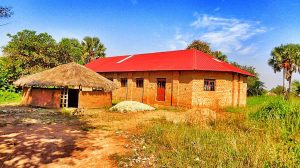
Community Description
The community of Marakonye has been around since the 1920s. The village is mostly comprised of Kakwa descendants and is based in Yei’s large teak forest. Since its conception, Marakonye has based its livelihood on agriculture. Many of the indigenous members grow sorghum, millet and cassava, in the forest. Lack of education and the dangerous, long trek to the nearest water source are the community’s greatest fears.
Problem Addressed
Cox Wai-Wai, the 56-year old chairperson for the Marakonye Primary School Parent Teachers’ Association (PTA), is married to Lona Monday. The parents, whose ten children range in age and attend the nursery school and the secondary school, are the honorary counselors of Yei Municipality.
Since the borehole broke two and a half years ago, the families have had to walk three miles to and from the nearest water source, forcing most of their children to be late to school or leave school midday because 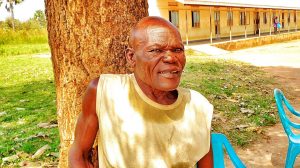 they are so desperate for hydration.
they are so desperate for hydration.
Viola is a young girl who faces problems similar to Cox’s children. The 15-year-old lives with her family and is responsible for gathering water for herself, her four siblings, and her parents. Before the borehole broke, she was easily able to get up at 6:30 am; since the borehole broke down, Viola has had to get up an extra hour and a half earlier to reach water a few miles away, in time to make it back for school. With her focus on gathering water, rather than her education, Viola has struggled to keep up in school and is worried about not making it to the next grade.
Ross Tabuis, a recent transplant to the area, is living hours away from his wife and two children in order to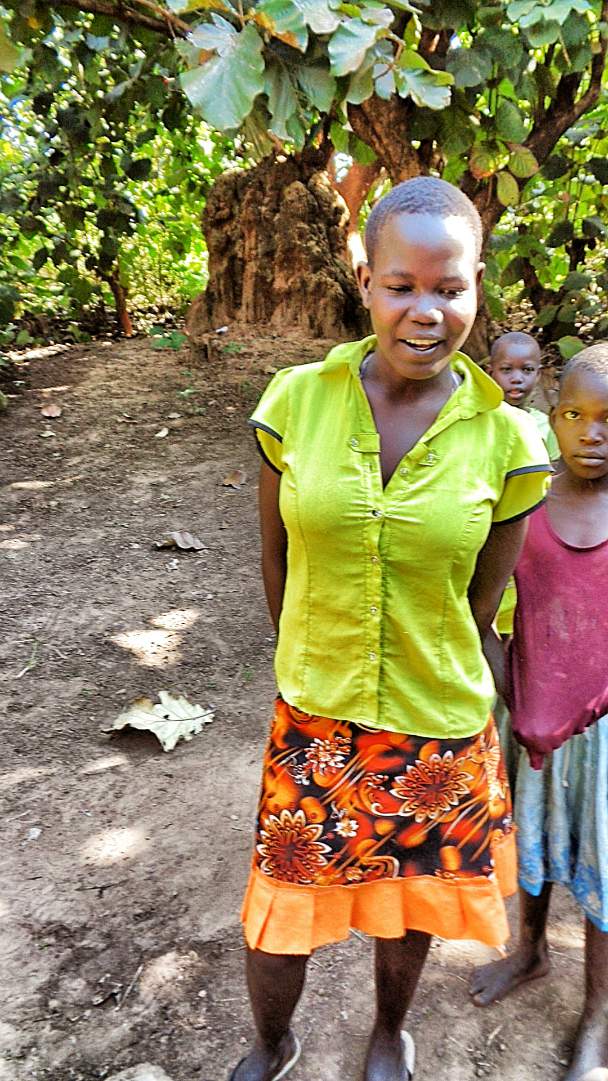 take care of his elderly parents in Marakonye. The borehole has been broken for two years and Ross’s parents have had to trek the long distance, a dangerous walk through the forest, to the only other available water in the area. Concerned for his parents’ safety, Ross has returned and begun purchasing water from a private borehole, a mile closer to his parents’ home. However, the owner of the borehole charges Ross 20ssp per month, this amount is four times the average amount for an entire household’s usage of the local, community borehole.
take care of his elderly parents in Marakonye. The borehole has been broken for two years and Ross’s parents have had to trek the long distance, a dangerous walk through the forest, to the only other available water in the area. Concerned for his parents’ safety, Ross has returned and begun purchasing water from a private borehole, a mile closer to his parents’ home. However, the owner of the borehole charges Ross 20ssp per month, this amount is four times the average amount for an entire household’s usage of the local, community borehole.
Project Description
Water is Basic, a locally run drilling company, will be in charge of repairing the borehole. The process will include removing the borehole head and dissecting every pipe and part to determine where the problem lies. The pipes that are rusted or broken will be replaced, and the WIB team will monitor the fix closely to better supply proactive problem-solving.
The repair of the Marakonye borehole will help residents’ money stay within the local economy. With monthly water usage fees, the local families will be able to create savings for future borehole repairs. Furthermore, the repair will help every child in the village refocus his or her attention on their schoolwork, instead of the dehydration they have been recently struggling to combat.
Project Impact
This project will impact 600 people.
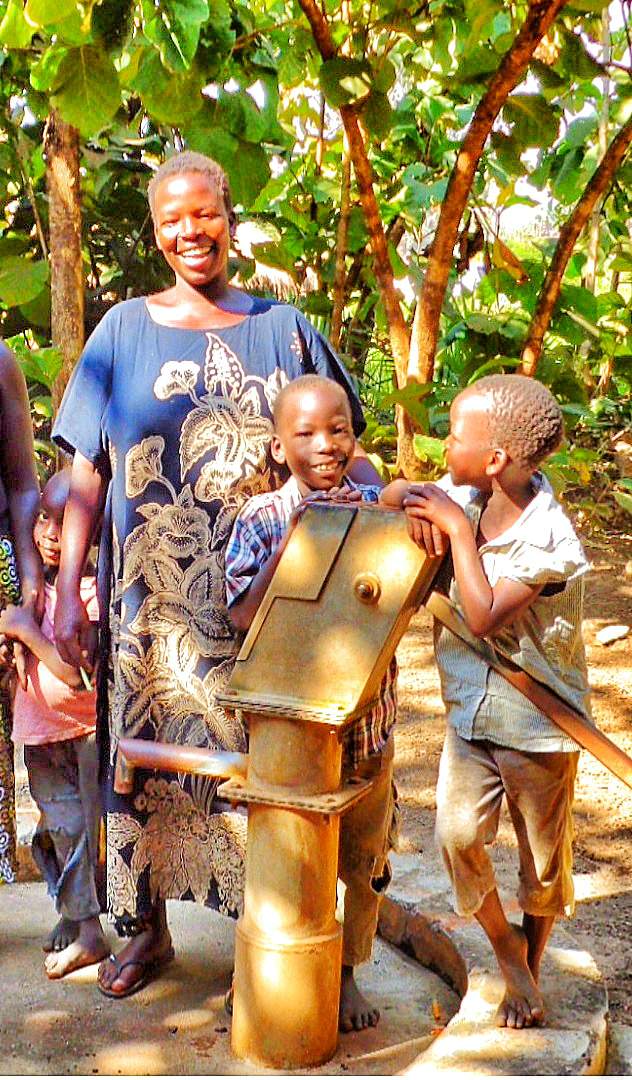 Volunteer Directing Project
Volunteer Directing Project
Steve Roese
Steve is President of Water is Basic U.S. An entrepreneur and pastor, Steve has been involved in South Sudan since 2004 where he has fought alongside his brothers and sisters for peace and opportunity. His motto is “whatever it takes” and he means it when it comes to building the new nation of the Republic of South Sudan.
Monitoring & Maintenance
The creation of a water committee is central to all of these projects, and it educates and empowers the community by helping them learn the importance of diverse and equal organization. The water committee becomes a reconciliation tool as mixed genders, tribes and religions work together to manage the community well. By aiding the village in developing a committee, and managing and maintaining their well, the village is able to collect and save money to dedicate to future repairs.
Comments
Water is Basic is a borehole drilling organization in the Republic of South Sudan. This organization is a Sudanese solution to a Sudanese problem, birthed and led by many religious Sudanese leaders in response to the country’s water crises.
Water is Basic operates an internship program where local, promising secondary school graduates manage our projects for one year. In exchange, they are given access to distance learning courses and then assisted in applying for and attending university.
While not an official Let Girls Learn project, it is in keeping with the goals and objectives of that program, and, as such, falls under Water Charity’s own Let Girls Learn + heading.
This project has been paid for by an anonymous donor. If you wish to see more great projects like this one, please contribute to our South Sudan Well Rehab Program by clicking on the Donate button below.
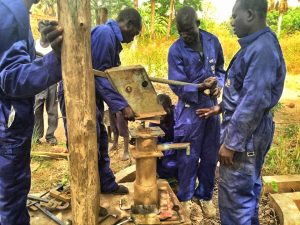
Marakonye Community Well Repair Conclusion – South Sudan
We are pleased to announce that the well in Marakonye Community has been successfully restored to full working order, and a committee for Water Use was established to make sure it stays viable long into the future!
On June 4, 2017, a signed peace accord officially ended the armed conflict in Yei River State between warring factions – the South Sudan People’s Liberation Army (SPLA) and the SPLA – In Opposition (SPLA-IO) Yei River State. Mediated by Bishop Elias Taban, leader of the Evangelical Presbyterian Church (EPC), the accord calls for a permanent ceasefire, an assembly area for armed rebels and their security, a planned national dialogue and the securing and opening of all roads to and out of Yei Town.
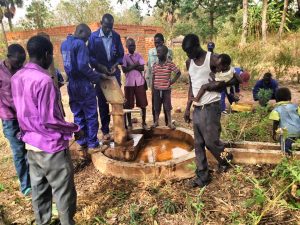 This allowed Water Charity & Water Is Basic to complete a large number of well rehabilitation projects in the region. An effort that is ongoing now. Crucial to the return of people to their homes and rebels to assembly points is working well-managed water points. The number of wells deserted and now needing simple repair is in the hundreds to thousands. Without them, it is difficult for people to return to their villages. And when the wells are functional, these villages swell in population as people seeking out subsistence in the area come to settle down.
This allowed Water Charity & Water Is Basic to complete a large number of well rehabilitation projects in the region. An effort that is ongoing now. Crucial to the return of people to their homes and rebels to assembly points is working well-managed water points. The number of wells deserted and now needing simple repair is in the hundreds to thousands. Without them, it is difficult for people to return to their villages. And when the wells are functional, these villages swell in population as people seeking out subsistence in the area come to settle down.
Water is life.
Community Description
Marakonye community has been in existence since the 1920s. The village once was mostly comprised of Kakwa descendants and is based in Yei’s large Teak Forest. Marakonye once based its livelihood on agriculture. Many of the indigenous members grew sorghum, millet, and cassava in the forest. Prior to the recent conflict in Yei, lack of education and the dangerous, long trek to the nearest water source were the community’s greatest hardships.
Due to the civil war in South Sudan, many community members were displaced and the well was abandoned. Now they are seeking newfound stability as they make their way back to their homes. Water is the primary need upon their return.
Problem Addressed
Mr. James Al-Haji is the chairperson for Marakonye Water Well. He and his children are displaced from Pakula Village. They escaped their village when it was raided by soldiers. His wife tragically lost her life in the conflict, and James is now a single father of four children. The youngest is 1 year old.
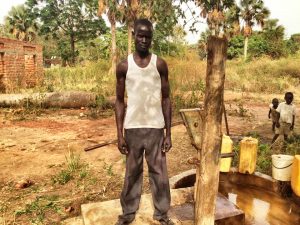 James and his family now live in the Marakonye community. Along with others in this village they are seeking to rebuild their lives. Again, it starts with water.
James and his family now live in the Marakonye community. Along with others in this village they are seeking to rebuild their lives. Again, it starts with water.
The Water is Basic well technicians assessed that the galvanized iron pipe (GI pipe) in this well had rusted and needed to be replaced. This was a simple fix that now allows everyone in this community to drink clean, freshwater.
Project Description
Water is Basic is a borehole drilling organization in the Republic of South Sudan. This organization is a South Sudanese solution to a South Sudanese problem, birthed and led by many religious, Sudanese leaders in response to the country’s water crisis.
Water is Basic’s strengths come from the experienced personnel leading the mission, and their determination and skills guiding the country to develop self-sustaining water systems. Further, these systems are managed and operated by local villages. It is their mission to build communities and empower the people of South Sudan to implement local solutions to local problems.
Water is Basic has been there from the beginning, birthed at the grassroots level, guided by local experience, and implemented by men and women who get what it means to go thirsty. This has given them a seat at the table of peace negotiations between the government of South Sudan and the SPLA-In Opposition, or rebel groups. Water is more than basic and is paving the way to peace.
Problem Impact
The restored well in Marakonye will be a source of life and stability for Mr. James Al-Haji and his family as they seek to heal from their loss.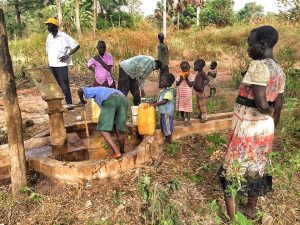 The children will not have to walk long distances for water and will not have the added burden of sickness due to unsanitary water.
The children will not have to walk long distances for water and will not have the added burden of sickness due to unsanitary water.
As they seek to start over, the repair of the Marakonye borehole will help residents’ money stay within the local economy. With monthly water usage fees, the local families will be able to create savings for future borehole repairs. Furthermore, the repair will help every child in the village refocus their attention on their school work, as they will no longer struggle with dehydration and sickness due to waterborne illnesses.
Project Directors
Steve Roese and Bishop Elias Taban
Steve Roese, President of Water is Basic U.S. is an entrepreneur and pastor. Steve has been involved in Sudan and now South Sudan since 2004 where he has fought alongside his brothers and sisters for peace and opportunity. His motto is “whatever it takes,” and he means it when it comes to supporting the local Water is a Basic team in their work of building a nation.
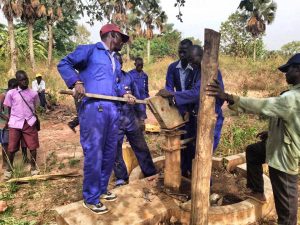 Bishop Elias Taban leads the efforts of Water is Basic South Sudan and co-founded the organization. A former Colonel in the Sudan People’s Liberation Army and founder of the Evangelical Presbyterian Church of South Sudan, Bishop Taban is an engineer, entrepreneur and pastor who is highly respected throughout all circles in South Sudan. He has also founded and run three orphanages, two hospitals, and a trucking company that helps to further fund well development and repairs. Bishop Taban is a tireless leader for solutions that build into the people and infrastructure of South Sudan.
Bishop Elias Taban leads the efforts of Water is Basic South Sudan and co-founded the organization. A former Colonel in the Sudan People’s Liberation Army and founder of the Evangelical Presbyterian Church of South Sudan, Bishop Taban is an engineer, entrepreneur and pastor who is highly respected throughout all circles in South Sudan. He has also founded and run three orphanages, two hospitals, and a trucking company that helps to further fund well development and repairs. Bishop Taban is a tireless leader for solutions that build into the people and infrastructure of South Sudan.
Steve Roese and Bishop Taban have been faithful to this mission for over a decade. Their presence and influence are leading to peace initiatives at the grassroots level. This could not be done without the faithfulness and generosity of their partners and donors.
Monitoring and Maintenance
After receiving detailed requests from public officials listing sites where well repairs are needed, the Water Is Basic staff gathers local people in each village to educate and empower them to form a committee to oversee the repairs. Once repairs are complete, the committee establishes a fee-based collection system for water usage and oversees the well operations.
These committees become a reconciliation tool as mixed genders, tribes and religions work together to manage the community well. By developing a committee, and managing and maintaining the well, the village is able to collect and save money to dedicate to future repairs.